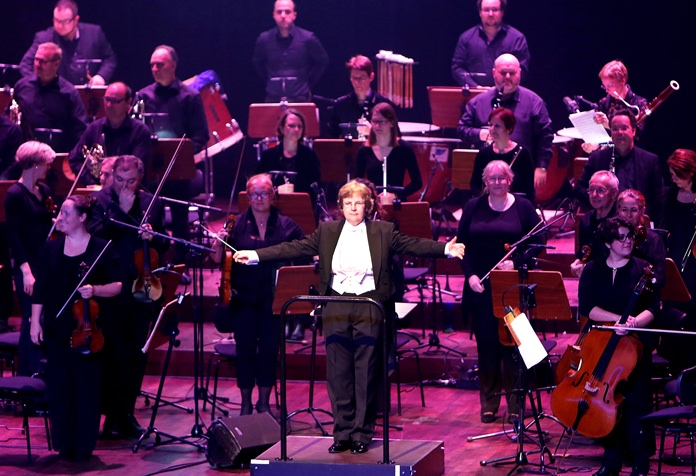
Frankfurt, Germany (AP) — Can performing Beethoven symphonies together help employees team up on projects at work, too? Some companies — above all in Germany and Asia — seem to think so.
 A conspicuous number of big German corporate names — along with a handful in Japan and Korea — have their own company-linked symphony orchestra. That means 60 or so accountants, engineers, sales reps and computer specialists who bring violins, cellos, oboes and trombones and gather in their spare time to rehearse and perform lengthy, complex pieces of classical music.
A conspicuous number of big German corporate names — along with a handful in Japan and Korea — have their own company-linked symphony orchestra. That means 60 or so accountants, engineers, sales reps and computer specialists who bring violins, cellos, oboes and trombones and gather in their spare time to rehearse and perform lengthy, complex pieces of classical music.
The orchestras serve as public relations tools, playing charity concerts and livening up corporate events.
But there’s more to it than that.
It’s hard to quantify, but the engineer and accountant musicians — and some business experts — argue that a symphony orchestra is an excellent model for the creative teamwork companies need to compete.
“There’s no activity in the world where you have to react so quickly to each other and work together so well as in an orchestra,” says Johanna Weitkamp, conductor of the symphony orchestra at the enterprise software company SAP.
Other companies with employee orchestras include engineering firm Siemens, maker of trains and medical scanners; carmakers Daimler, BMW and Ford; auto components and electronics maker Robert Bosch GmbH; airline Lufthansa, and chemical firm BASF.
Most of the orchestras seemed to have started from the bottom up, from employee initiatives. The SAP orchestra started after Weitkamp joined the company in 1997 and noticed that there were a lot of skilled amateur musicians among her colleagues. “I asked, who wants to join in,” she said.
Weitkamp herself is no mere amateur; she studied conducting at the University of Music and Theater in Leipzig in her native East Germany. Her teachers included the renowned conductor Kurt Masur, a future music director of the New York Philharmonic. But after the Berlin Wall fell, she got another degree, this time in information technology, and moved into the computer field.
She said it’s no surprise that people with math or technology backgrounds are often musical: “You need a high degree of abstract thinking to understand how music functions, and I think there’s a connection that exactly in this field you find so many people who can play violin, oboe, bassoon, clarinet, flute or horn.
Anna Medina, who manages translation projects at SAP and plays in the violin section, said music “gives you skills that you can then apply to basically any job.”
“It gives you a sense of effort, that you have to practice to get things right. It also teaches you that you cannot wait until the last minute. You need to work on it all the time if you want to be successful,” she said before heading out on stage to rehearse.
There is one reason behind this burgeoning corporate orchestral scene that should not be forgotten: classical music is a part of Germany’s national culture and a lot of people learn instruments as children.
The same appears true in Asia, where Western classical music has caught on in a big way in recent decades. Company orchestras also can be found in Japan, Korea, and Taiwan.
In Asia, the science and technology theme pops up again: companies with orchestras in Korea include electronics and chemicals conglomerate LG and automaker Hyundai Motor Group, and Sony, Hitachi and Toshiba in Japan.
At Bosch, Georg Blume, a 37-year company veteran, considered a career as a cellist but is glad he chose engineering instead.
That way, music remains a hobby and “a wonderful respite” from his professional duties as head of product management for automated driving.
The orchestra, he said, is “a platform for informal exchange among employees, which in an organization as large as Bosch is very important, because the organization doesn’t just function according to reporting lines — but through colleagues getting to know one another.”





